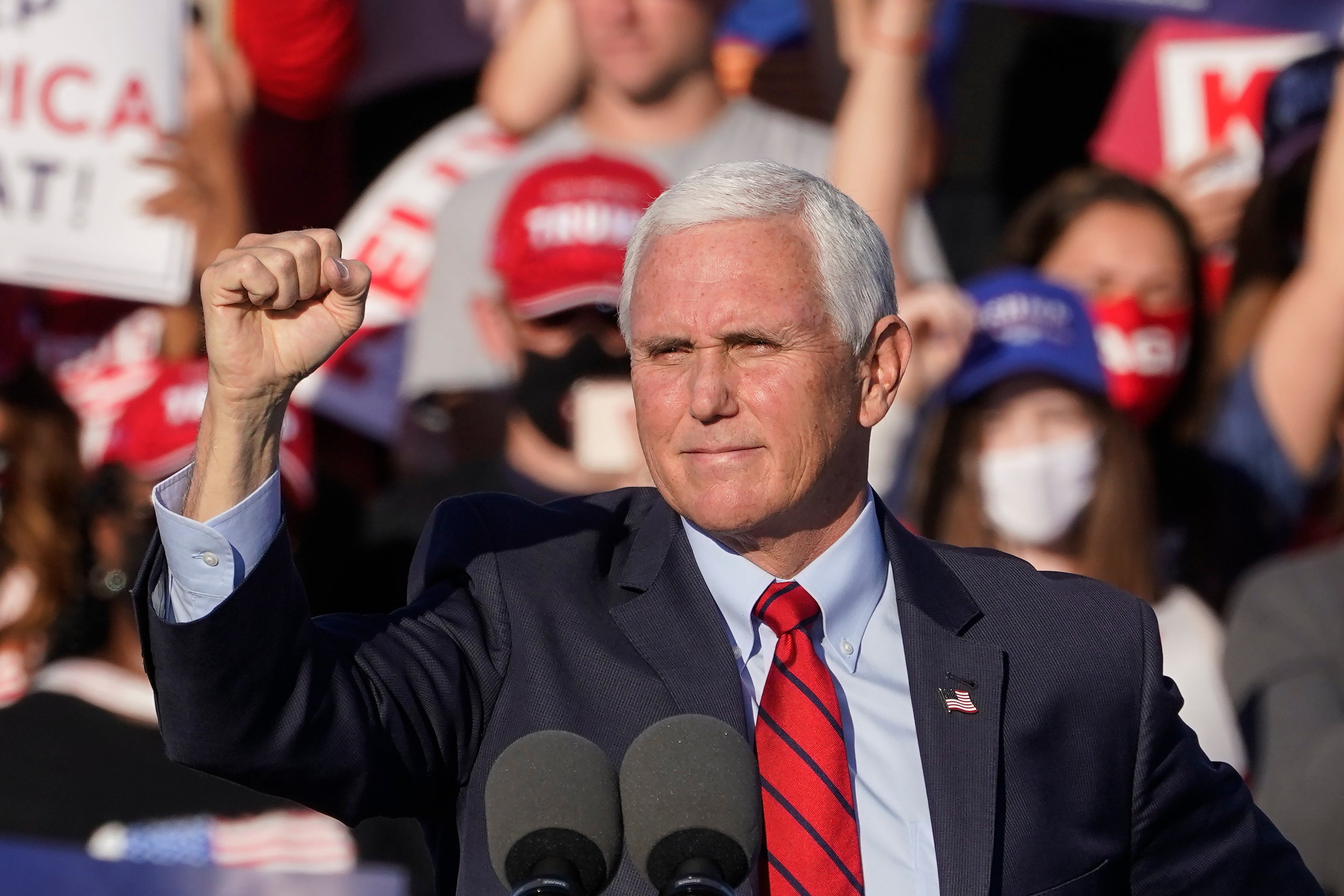GOP places focus anywhere but Atlanta in Georgia runoffs
Vice President Mike Pence has seemingly been holding rallies everywhere in Georgia lately

Your support helps us to tell the story
From reproductive rights to climate change to Big Tech, The Independent is on the ground when the story is developing. Whether it's investigating the financials of Elon Musk's pro-Trump PAC or producing our latest documentary, 'The A Word', which shines a light on the American women fighting for reproductive rights, we know how important it is to parse out the facts from the messaging.
At such a critical moment in US history, we need reporters on the ground. Your donation allows us to keep sending journalists to speak to both sides of the story.
The Independent is trusted by Americans across the entire political spectrum. And unlike many other quality news outlets, we choose not to lock Americans out of our reporting and analysis with paywalls. We believe quality journalism should be available to everyone, paid for by those who can afford it.
Your support makes all the difference.Vice President Mike Pence has seemingly been holding rallies everywhere in Georgia lately. Everywhere, that is, except Atlanta and its inner suburbs.
Pence touches down in Georgia again Thursday for a pair of rallies in Columbus, on the state's western edge, and Macon, in middle Georgia, to support incumbent Republican senators David Perdue and Kelly Loeffler ahead of runoff elections on Jan. 5 that will determine control of the U.S. Senate. Pence has been to Augusta in the east and Savannah on the coast and has rallied voters in the north Georgia cities of Gainesville and Canton, in the far reaches of metro Atlanta's exurbs. President Donald Trump rounded out the map with a Dec. 5 rally in Valdosta in south Georgia.
The anywhere-but-Atlanta strategy is a window into Georgia’s new political geography. Democrats dominate in the urban areas and in nearby suburbs, while Republicans are increasingly dependent on high turnout in rural areas, small towns and small cities across the state. It’s a Trump-era pattern that puts the once-red state in line with battlegrounds across the country, and Democrats are hoping it outlasts his presidency.
“The fact is they’re going to places where Republicans have the best margins, trying to energize their voters," said Brian Robinson, a GOP strategist in Georgia, while noting that the events get statewide media coverage and, therefore, still reach Atlanta-area voters.
“In some of these rural counties, Perdue and Loeffler really need to hit 80-plus percent" of the vote, Robinson said, “and they need to juice the turnout in those counties as much as they can.”
In his repeated trips, Pence has pitched Perdue and Loeffler as the last line of defense to preserve work done under the outgoing Trump administration. A win by either Perdue or Loeffler would keep the Senate majority in the hands of Republicans. But a sweep by their Democratic challengers, Jon Ossoff and Raphael Warnock, would yield a 50-50 split in the upper chamber, giving the tiebreaking vote to Vice President-elect Kamala Harris.
“With the support of people all across this state, and with God’s help, we’re going to keep on winning,” Pence told a crowd of several hundred in Augusta last week. “We will win Georgia and save America.”
Tim Phillips, president of the conservative political advocacy group Americans for Prosperity, described two tracks of the Republican electorate: voters who identify more with Trump’s brand of populism and voters who fit more traditional GOP molds — a group that includes both Trump loyalists and Republicans who are uneasy with or dislike the president.
The first group dominates in small-town and rural Georgia, and it’s an important component of maximizing Republicans’ vote hauls in the exurbs that ring the sprawling Atlanta metro area and the swaths of the electorate that surround the Democratic cores of Georgia’s midsize cities.
That’s why Trump visited Valdosta, near the Florida state line, to draw a massive crowd from across south Georgia, and why Pence’s multiple trips have included Savannah and Macon to draw non-metro-Atlanta crowds and Canton and Gainesville to hit the periphery of the metropolitan area.
In a battleground like Georgia, Phillips said, it takes strong turnout across all those slices to make a victorious Republican coalition, before even beginning to account for swing voters that are more common in the close-in suburbs of Atlanta.
“Our first target audience has to be the presidential-only or Trump-centric voters. We need them to turn out,” he said. “A drop of 10% or 15% in places like Valdosta,” he added, could make “swing voters in Gwinnett County” moot.
Recent election returns demonstrate Phillips’ argument.
In 2014, Perdue won his first Senate term with a comfortable statewide margin of 198,000 votes over Democrat Michelle Nunn. Across the heavily Republican areas of north Georgia, beyond Gainesville, where he campaigned with Pence last month, Perdue consistently won as much as 75% of the vote. In Lowndes County, where Trump visited earlier this month, Perdue won 12,513 votes, good for 58%.
In November, Perdue pushed his margins across many of the north Georgia counties to 80%. His raw vote total in Lowndes County spiked to 25,620. But despite all those gains, he led Ossoff by only 88,000 votes and failed to reach the outright majority required to avoid a runoff.
___
Associated Press writer Meg Kinnard in Augusta, Georgia, contributed to this report.